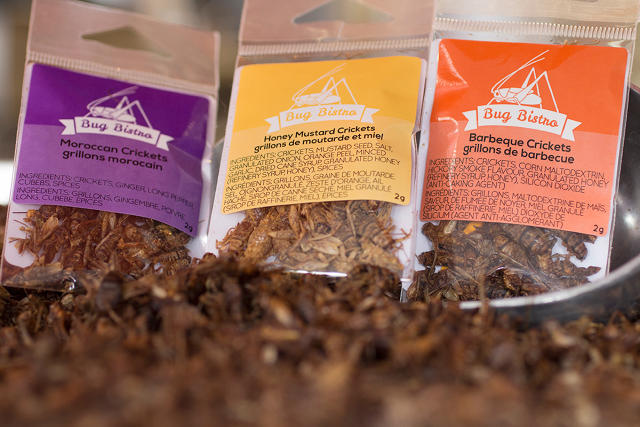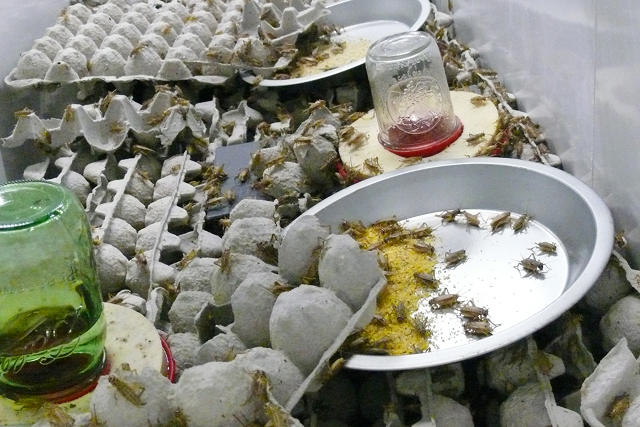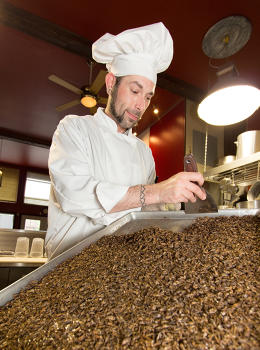INSIDE THE EDIBLE INSECT INDUSTRIAL COMPLEX
AS HUMANS EAT MORE BUGS, A $20 MILLION INDUSTRY HAS SPRUNG UP--COMPLETE WITH EDIBLE INSECT BUSINESS CONSULTANTS.
Each morning after arriving at his office in Youngstown, Ohio, Kevin Bachhubersteps into the 5,000-square-foot warehouse and listens to his crickets chirping. The owner and founder of Big Cricket Farms, which raises insects exclusively for human consumption, Bachhuber knows that the frequency and sound of crickets’ chirps can be an indicator of their well-being. And in order for his brand-new company to survive, so must the crickets. At least for now.
Big Cricket Farms opened for business this past April. The startup’s customers are restaurants and distributors as well as businesses that process crickets for food-product companies, and Bachhuber has been shocked at the strength of the demand. “I thought I was going to be laboring in obscurity for 12 to 18 months minimum,” he said. “I’m currently back-ordered by thousands of pounds.” The original business plan called for three years to realize profits; now it looks like he’ll hit that mark after just one.
Big Cricket Farms opened for business this past April. The startup’s customers are restaurants and distributors as well as businesses that process crickets for food-product companies, and Bachhuber has been shocked at the strength of the demand. “I thought I was going to be laboring in obscurity for 12 to 18 months minimum,” he said. “I’m currently back-ordered by thousands of pounds.” The original business plan called for three years to realize profits; now it looks like he’ll hit that mark after just one.
Until recently, bug eating in the United States was more closely associated with reality show competitions and fraternity hazings than with energy bars and coconut–chocolate chip cookies. But with the burgeoning success of several bug-laden food companies, human insect consumers seem to be on the rise. Six Foods, based out of Boston, raised over $70,000 on Kickstarter and is briskly locking in preorders of Chirps, tortilla chips made with roasted, finely ground cricket “flour” that come in barbecue, sea salt, and aged cheddar flavors. Bitty Foods in San Francisco is selling cricket-packed pastries. And just last month makers of cricket flour protein bars, secured $1.2 million in financing from investors.
And wherever there is a marketable product, there is a supply chain. In this case, entrepreneurs like Bachhuber are rushing to feed America’s newfound hunger for edible insects.
Turns out that a whole ecosystem--including, of course, bug business consultants--has sprung up to prop up the estimated $20 million and growing industry.

Some of these businesses, like cricket farming, aren’t actually new: for decades companies like Armstrong Crickets and Timberline have bred insects for use as bait orpet food. But human consumers tend to be more particular about how their food is raised than reptiles. When Jarrod Goldin and his brothers launched Next Millennium Farms in southern Ontario in November 2013, the food startups they worked with had very specific requests about the diet of the crickets bound for their products. Though the Goldin family had long operated a separate pet-feed cricket farm, they had never before been asked to raise their crickets on a non-GMO or gluten-free diet. In addition, Goldin reports, the farm will often customize the feed according to particular company’s needs. “If people want a higher vitamin A profile, we'll feed them carrots,” he says. “We have distinct lines where we feed the crickets cinnamon and apples, and the flour takes on an apple and cinnamon flavor.”
Though Next Millennium hasn’t yet been in business a full year, they’re producing and selling 8,000 to 12,000 pounds of crickets a month--roughly 60 tons annually--and they expect that number to double in the next year. They’ve already outgrown their current headquarters and are moving into a space ten times the size.
“The industry just exploded,” Goldin says, explaining that demand has spread beyond the new insect-food startups. “We’re speaking with major food manufacturers--it’s confidential who they are, but the biggest names.”
One of the most challenging issues facing this new, rapidly growing industry is record-keeping. In order to comply with food safety standards, everything the crickets eat or do must be logged. And because the life cycle of insects is so distinct from those of traditional livestock--it takes less than seven weeks for a cricket to grow to its ideal, tastiest age (“slightly pubescent,” says Kevin Bachhuber)--existing farm-management models don’t really apply.
Though Next Millennium hasn’t yet been in business a full year, they’re producing and selling 8,000 to 12,000 pounds of crickets a month--roughly 60 tons annually--and they expect that number to double in the next year. They’ve already outgrown their current headquarters and are moving into a space ten times the size.
“The industry just exploded,” Goldin says, explaining that demand has spread beyond the new insect-food startups. “We’re speaking with major food manufacturers--it’s confidential who they are, but the biggest names.”
One of the most challenging issues facing this new, rapidly growing industry is record-keeping. In order to comply with food safety standards, everything the crickets eat or do must be logged. And because the life cycle of insects is so distinct from those of traditional livestock--it takes less than seven weeks for a cricket to grow to its ideal, tastiest age (“slightly pubescent,” says Kevin Bachhuber)--existing farm-management models don’t really apply.

Enter Tiny Farms, a San Francisco–based edible-insect consulting firm (yes, you read that right). In addition to designing more efficient and scalable insect farm habitats, says Andrew Brentano, one of Tiny Farms’ founders, the firm is developing a web-based “insect farming platform” to help farmers optimize their practices and track their product.
Once the “harvested,” frozen crickets leave the farm, they move one step further along the edible-insect production pipeline. Fast-growing food businesses don’t have the time or facilities to roast and grind thousands of pounds of insects a month--they need access to already processed ingredients, like the finely milled cricket powder sold by companies like All Things Bugs.
Once the “harvested,” frozen crickets leave the farm, they move one step further along the edible-insect production pipeline. Fast-growing food businesses don’t have the time or facilities to roast and grind thousands of pounds of insects a month--they need access to already processed ingredients, like the finely milled cricket powder sold by companies like All Things Bugs.
The founder of All Things Bugs, self-proclaimed “recovering academic” Aaron Dossey, has spent two years researching and finessing the process of making the most nutrient-dense cricket powder possible. (His methods are proprietary, of course--a good cricket miller never gives away his secrets.)
Dossey initially planned to create and market a protein bar, but then realized his R&D skills might be put to better use in other ways. “I was sitting in my apartment late one night watching Letterman and looking around on Kickstarter,” he says, “and I thought, nobody's making the ingredients.” He sold his first batch of cricket powder this past January, and he anticipates sales to increase from 6,000 pounds in 2014 to 60,000 pounds in 2015.
Dossey initially planned to create and market a protein bar, but then realized his R&D skills might be put to better use in other ways. “I was sitting in my apartment late one night watching Letterman and looking around on Kickstarter,” he says, “and I thought, nobody's making the ingredients.” He sold his first batch of cricket powder this past January, and he anticipates sales to increase from 6,000 pounds in 2014 to 60,000 pounds in 2015.

It’s this sort of growth that has insect entrepreneurs convinced that eating bugs is not a trend, but an inevitability. “Cricket meal will be a commodity traded on the stock market, just like oil, orange juice, and coffee,” predicts Jarrod Goldin. But despite the industry’s rapid rise, it’s still nascent. “It’s like we’re creating and selling beef jerky when there are only three cattle ranchers in the country,” says Exo cofounder Gabi Lewis, who hopes the success of competitors like Chapul and Hopper Bars will encourage other potential suppliers and ultimately drive down costs. (Premium, human-grade cricket flour currently sells for $30-$40 a pound. Wholesale.)
Those prices certainly don’t hurt entrepreneurs like Kevin Bachhuber, who isn’t fazed by the prospect of copycat cricket farms popping up across the country. He does, however, have some concerns about the expansion of an industry already handicapped by the “ick factor,” as many edible-insect experts put it.
“I need competition. It’ll keep me honest, it'll allow our industry to grow faster,” he says. “But I want to make sure that they're making good food. If someone ends up running off bad batches of crickets, it could doom our industry as a whole. It just takes one bad player to mess everything up for everyone.”
Those prices certainly don’t hurt entrepreneurs like Kevin Bachhuber, who isn’t fazed by the prospect of copycat cricket farms popping up across the country. He does, however, have some concerns about the expansion of an industry already handicapped by the “ick factor,” as many edible-insect experts put it.
“I need competition. It’ll keep me honest, it'll allow our industry to grow faster,” he says. “But I want to make sure that they're making good food. If someone ends up running off bad batches of crickets, it could doom our industry as a whole. It just takes one bad player to mess everything up for everyone.”
No comments:
Post a Comment